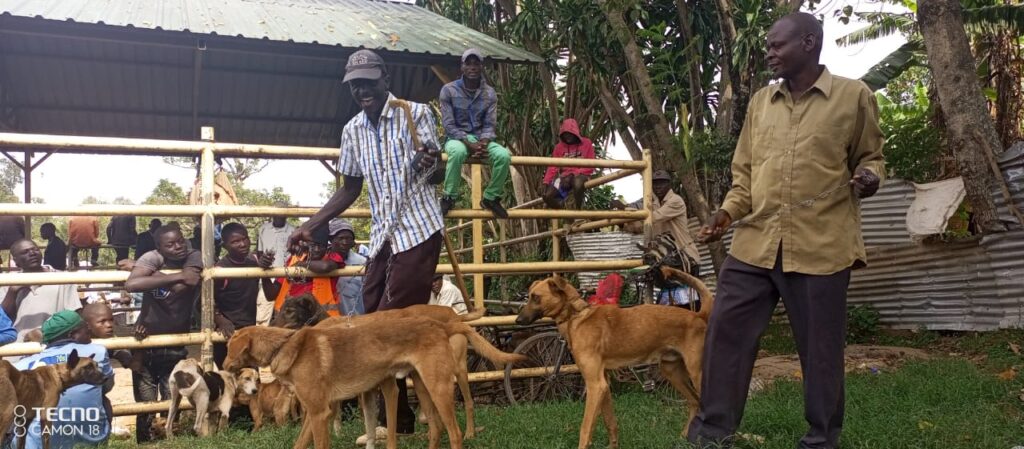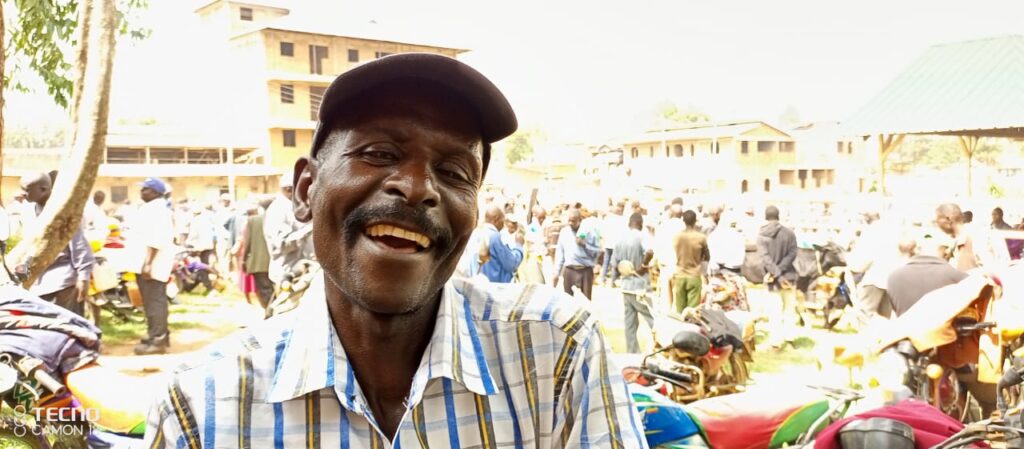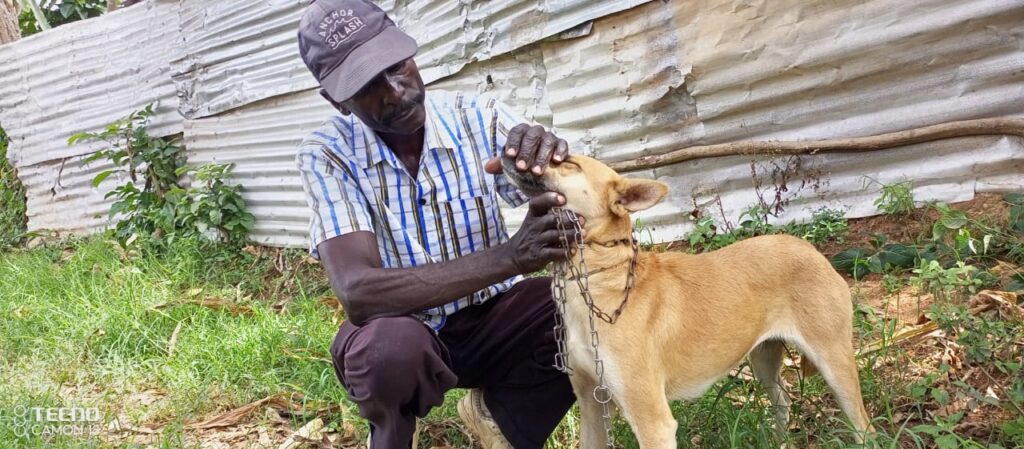It is Thursday morning at Lubao Market in Kakamega County.
Fifty-six-year-old Mzee Jackson Makanji Iloli is pulling four dogs into a market shed.
A friend who was already in the dog business influenced me to join him. I have never regretted
Mzee Makanji
“This is our business site. It was constructed two years ago to boost dog business,” he says as he gets into the shed.
Makanji has been in the dog business for the past 15 years.
He was initially buying and selling cattle.
“A friend who was already in the dog business influenced me to join him. I have never regretted,” he says.

Dog markets
In Kenya, the dog business is not so conspicuous, in markets.
But here in Lubao, there is space allocated for dog sellers, complete with a market shade.
The site is located adjacent to the shed set aside for cattle sellers.
When Lake Region Bulletin visited the area, Makanji was all smiles to receive us.
We had communicated with him a few weeks before, to plan for an interview on the status of the dog business.
And when we arrived, he was making transactions for a buyer from Kisumu.
“I wish you came a little earlier. We have sold most of the dogs. This man has come all the way from Kisumu,” he says as he ushers out the client from the shade.

Mzee Kamanji
Mzee Makanji was born 56 years ago at Lubao Mang’ang’a village of Shinyalu, in the current Kakamega County.
He is married to one wife to whom they have been blessed with eight children.
“And I have schooled all of them from this dog business,” he rumbles amid cracking laughter.
He tells us that just like other parts of Kenya, dogs were never for sale.
“If someone wanted a dog, he would approach anyone whose dog has delivered, and borrow one,” he says.
He adds: “As a form of appreciation, the person getting the dog would give a dog owner a chick.”
Dog trade
But at some point, in the late 1960s, theft of dogs crept in.
There was growing interest on dogs for security purposes, and hunting.
Soon, people begun looking for dogs to buy.
Lubao market provided the best opportunity for this trade.
And soon the market begun to identify with dog business.
As we engage Makanji, a man shows up.
Linus Ndeche
He is Linus Ndeche, the man who influenced Makanji to get into the dog business.
Ndeche who was born in 1967 at Senyende village got into the business in 1996.
For him, he still sells cattle in addition to dogs.
The friend used to go for dogs in Nandi, and needed someone to keep him company
Ndeche
He was also influenced by a friend who needed ‘company’.
“The friend used to go for dogs in Nandi, and needed someone to keep him company,” he said.
And after a single trip, Ndeche discovered the secrets of the business, and joined it.
Nandi dogs
According to Ndeche, the cold weather in Nandi seems to be appropriate for the reproduction of dogs.
“Dogs there give birth to so many puppies, and many of them survive,” he says.
The dog sellers have to trek from Shinyalu to Nandi.
Dogs there give birth to so many puppies, and many of them survive
Ndeche
They stay in Nandi for between two to five days collecting dogs.
“Once we have collected enough, we begin our journey back,” he says.
But what is the secret to this thriving business?
Mzee Makanji says their secrets have been in understanding the dogs.
Dogs can be understood from two levels.
“They can be categorized as ‘home guards’ or ‘hunters’. So whoever wants to buy a dog must specify for us,” he says.
Dangerous tests
Before we pick the dogs, we have to do our own tests.
One of the tests include scaring the dog to check its reaction.
“When the dog runs away, that is not good to guard a home. But if it surges towards you, then that is fine,” says Makanji.
This is however a dangerous test, and once in a while they get bitten by the dogs which misunderstand the tests for threats.
For the hunters, they take a dog to a nearby thicket, and do a hunting demonstration.
If the dog is able to sniff into the thicket, that is a hunter, but if it stays staring at you, reject that one.

Ndeche says many of the buyers also want dogs with straight earlobes.
“This shows that the dog is alert,” he explains.
To check if the dog has any disease, they hold the dogs hanging from the hind legs and swing them for several rounds.
They drop the dogs and observe them.
When they produce some foamy saliva, they have some infection.
They also observe how long the dog takes before regaining consciousness.
If it takes long, then the dog could be sick.
This test also helps to identify stray dogs.
